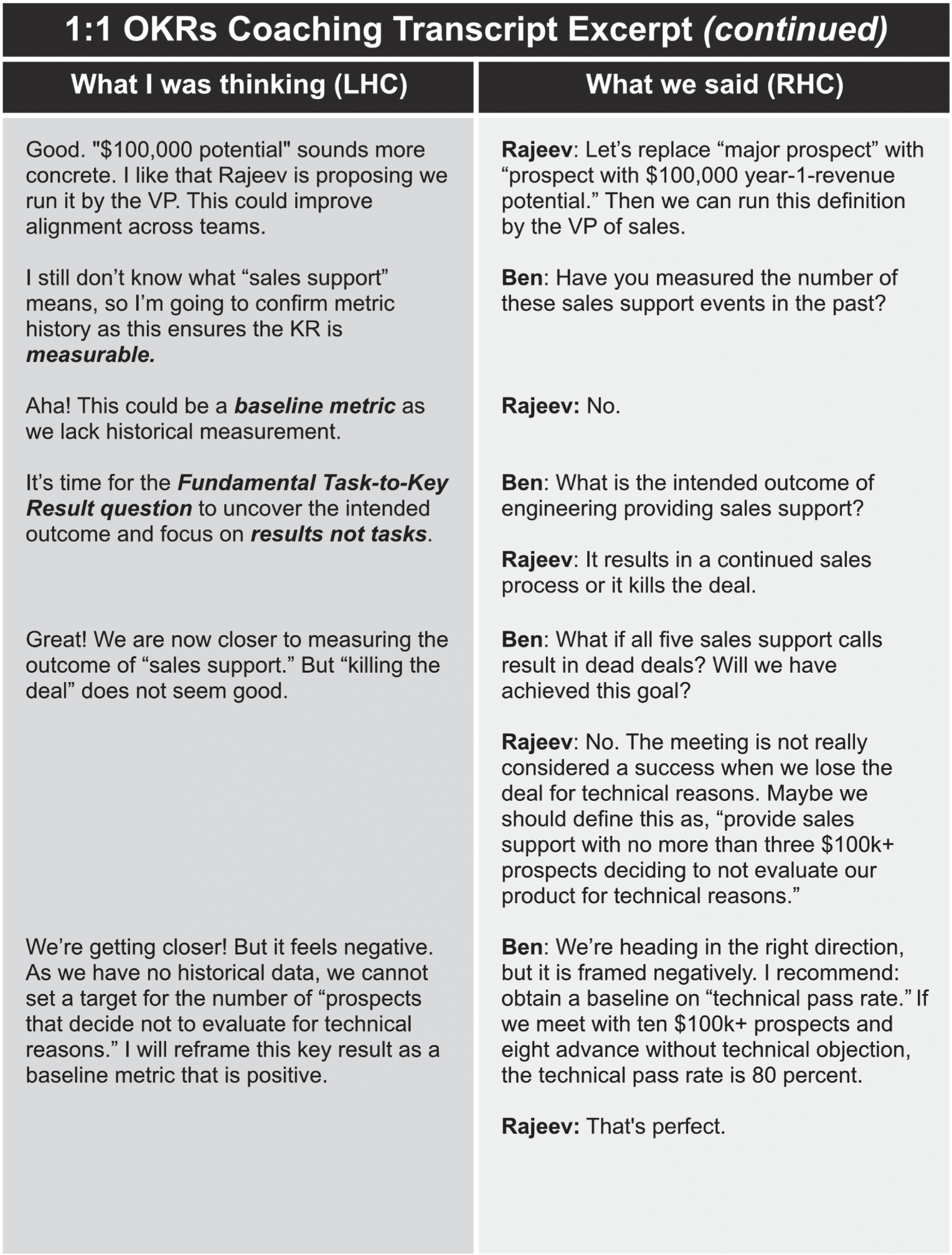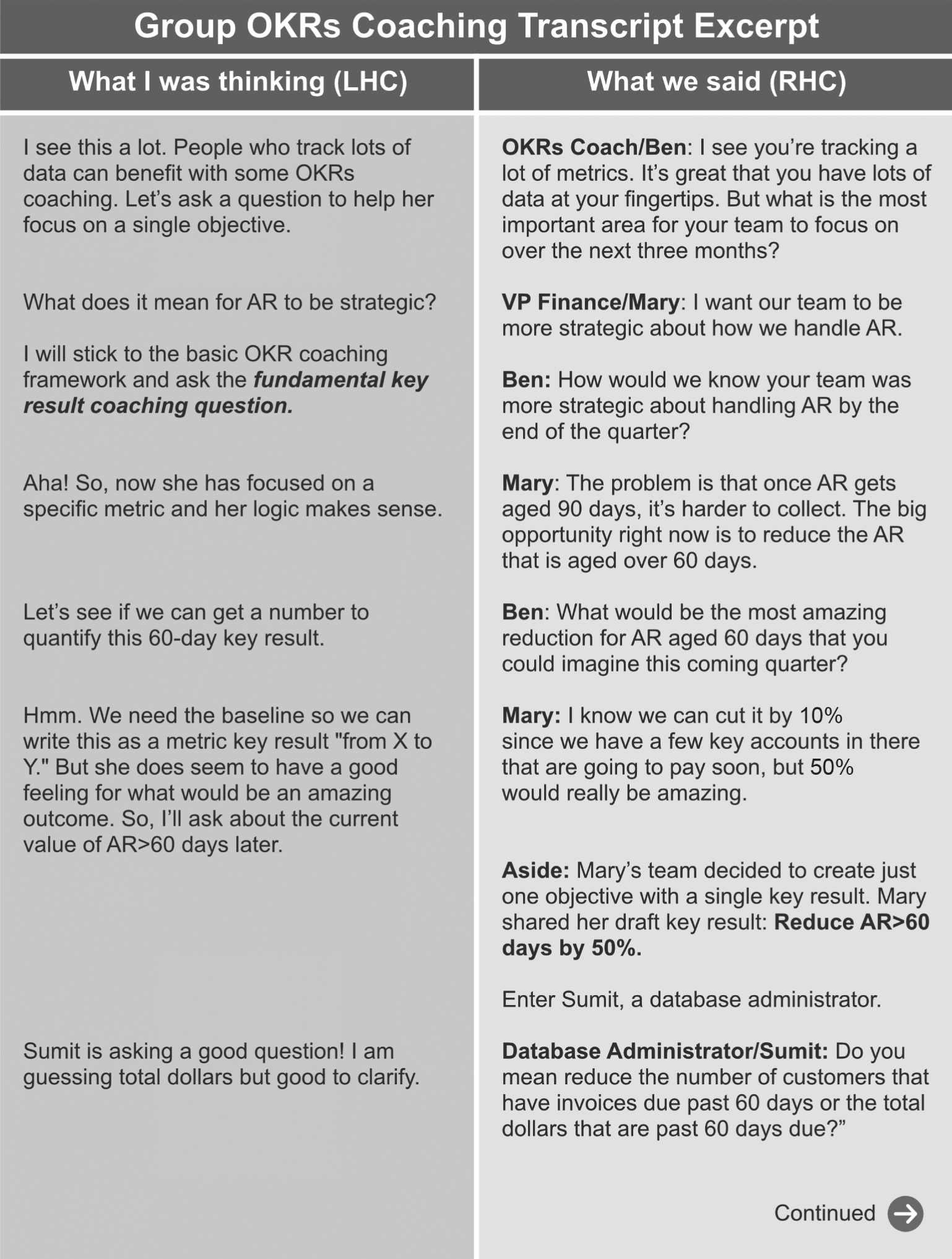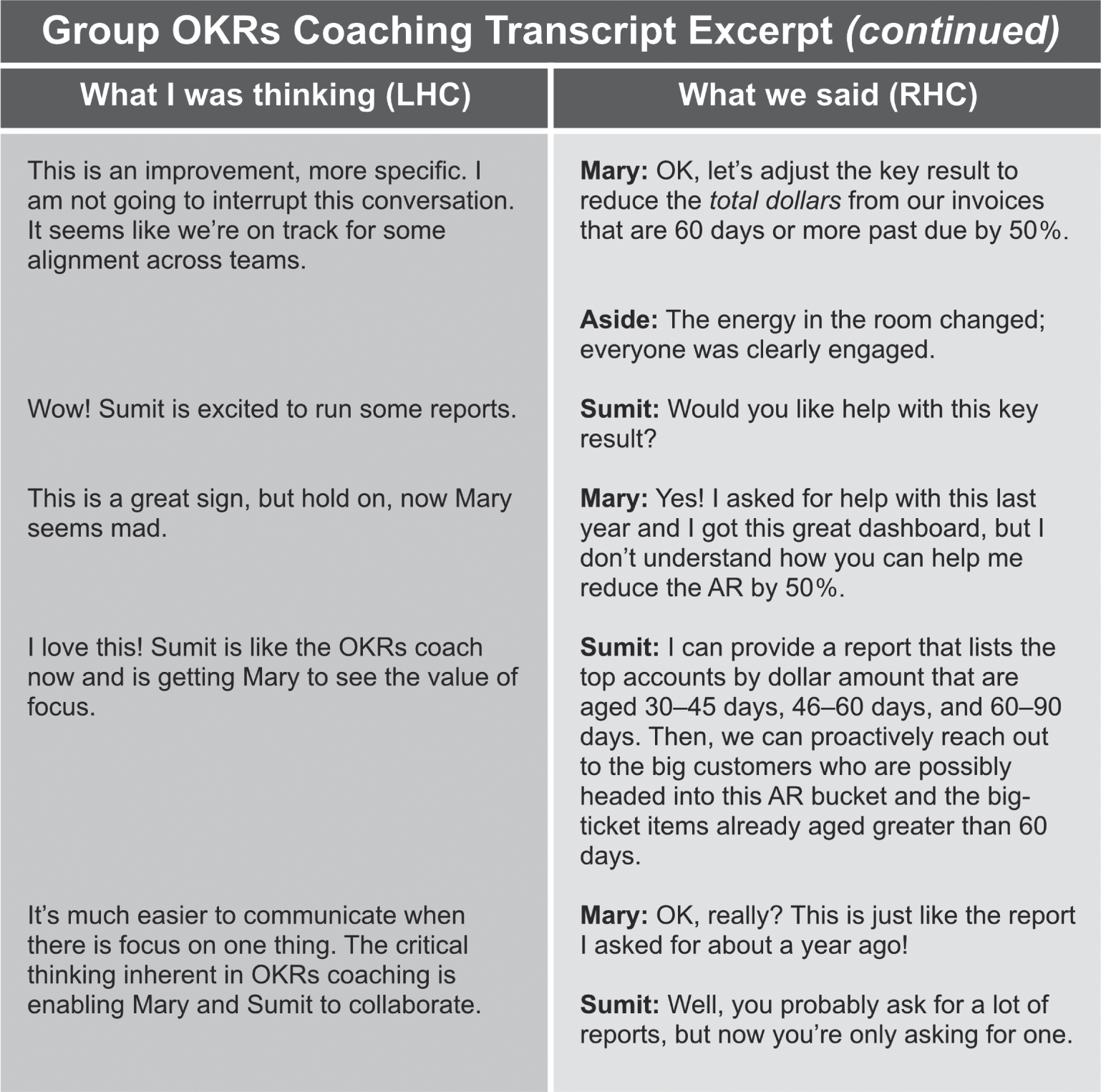CHAPTER 1
What Is OKRs Coaching? Why Is It So Important Now?
THE MOST IMPORTANT THING I learned in graduate school was not part of the engineering curriculum. It was something I learned from Dennis Matthies, a lecturer in the 1990s at Stanford's Center for Teaching and Learning. As part of his Accelerated Learning course, Matthies explained that prior to embracing a new skill, you should reflect on why you've chosen to take on the challenge in the first place. He presented data and shared examples to back this up. It seems obvious to me now; learning is accelerated when we can clearly explain why we're putting in the time to develop new skills. So, building off Dennis's teachings, let's explore why now is the right time to develop OKRs coaching skills.
This chapter begins with a brief recap of the history of OKRs. It describes how OKRs coaching demand emerged in the 2010s and started growing exponentially in 2018 into a mainstream business practice across the globe. After presenting the definition of OKRs coaching, the chapter ends with excerpts from actual coaching sessions to make the definition more concrete. The goal of this first chapter is for you to clearly state why OKRs coaching is important right now and why you have chosen to develop your coaching skills.
CURRENT STATE OF OKRs AND WHY NOW iS THE TIME TO DEVELOP OKRs COACHING SKILLS
As context for the current state of OKRs, let's go back to where it all started. In the late 1970s, Andy Grove introduced OKRs as an evolution of Management by Objectives (MBOs). Grove was then the CEO of Intel. As key executives left the company, they spread the word on OKRs to emerging big players such as Oracle in the 1980s and Google in the 1990s. By 2010, dozens of tech companies in Silicon Valley were using OKRs as a system for defining and achieving their most important goals.1 So, if OKRs had been around for nearly 50 years, why the sudden interest in OKRs in 2013? Short answer: Google.
In early 2013, Google Ventures partner Rick Klau shared a video on how Google was using OKRs.2 The video was wildly popular. Its impact led to the first spike of interest in OKRs outside the Silicon Valley and, indeed, outside the tech world.
In 2014, when the CEO of Sears viewed Klau's video, he immediately rolled out OKRs across the entire organization. Sears Holding Company is not a tech company by anyone's definition. The introduction of OKRs at Sears exemplified its expanding popularity and is just one of many examples of the growth of OKRs across business sectors.
With the popularity of OKRs gaining traction, business leaders and management consultants from all over the world began approaching OKRs coaches for both coaching and support. In 2016, Christina Wodtke published Radical Focus, the first book dedicated to the topic of OKRs. Later, in 2016, the book Objectives and Key Results, by Niven and Lamorte, introduced the steps for deploying OKRs. This book offered case studies from organizations around the world, as the interest in OKRs was growing outside the United States. Both Radical Focus and Objectives and Key Results became essential reading for anyone interested in OKRs, and both were translated into several languages.
In 2017, I made multiple trips to China, where I partnered with Beisen, a leading HR software company based in Beijing. I delivered a series of OKRs training workshops in Beijing, Shanghai, and Shenzhen to certify 200 business leaders. During one of these trips to China, I was lucky enough to spend a couple days with executives at Huawei, one of China's leading technology companies. At Huawei, I met Kuang Yang, an OKRs expert who not only translated the OKRs book I coauthored, but also went on to write the first book dedicated to OKRs written in Chinese.3 Kuang explained that the impact of Huawei's success with OKRs in China was comparable to the impact of Google's success with OKRs on tech companies in the United States.
By the end of 2017, OKRs were taking off across the globe. In addition to collaborating with organizations in China, I had clients based in Singapore, Australia, Poland, South Africa, France, Germany, Israel, India, Norway, the Netherlands, the United Kingdom, and Canada. However, even in 2017 the demand for OKRs coaching was still nascent. In early 2018, I had roughly one call per week with a different company exploring OKRs. I continued to allocate a portion of my time to marketing efforts such as speaking on OKRs and posting content to The OKRs Blog on OKRs.com. But then 2018 happened.
The interest in OKRs started to grow exponentially after John Doerr's book on OKRs, Measure What Matters, hit the market in April of 2018. The stories in Doerr's book featured big names like Bono and Bill Gates. With a growing interest in OKRs came an increased demand for OKRs coaching. I shifted my focus exclusively to deliver OKRs coaching to my clients. I finally had the problem I always wanted: too many leads! We expect the global demand for OKRs coaching will continue to rise throughout the 2020s. Given that OKRs coaching is such a big deal, let's define it.
What Is OKRs Coaching?
To define what OKRs coaching is, let's begin by looking at what OKRs coaching is not. OKRs coaching is not consulting. Unlike consultants, who mostly advise their clients, coaches focus on inquiry.
The International Coaching Federation defines coaching as “partnering with clients in a thought‐provoking and creative process that inspires them to maximize their personal and professional potential.” Where a consultant tends to offer recommendations and answers (advocacy), a coach tends to ask questions and clarify thought processes (inquiry).4 The part of the Federation's definition that we want to emphasize is the “thought‐provoking and creative process,” as that reflects the OKRs coaching focus on inquiry.
If you are an experienced coach, making the transition to OKRs coaching may be quite natural. Seasoned coaches often report that they just need to make minor adjustments as they are already asking many of the same questions we classify as “OKRs questions.”
However, if you are making the transition from consulting to coaching, you may need to make a concerted effort to focus on inquiry rather than simply giving advice. An OKRs coach does not focus on providing answers; an OKRs coach focuses on clarifying and providing the questions that help their client find their own answers.
Whether you have a consulting or coaching background, it is essential that you balance advice with inquiry. Inquiry is foundational to OKRs coaching and helps discover answers. An OKRs coach must know when to provide advice on the best way to phrase the answers in the context of objectives and key results as well. To arrive at a definition of OKRs coaching, it helps to understand your role as an OKRs coach and the extent to which you advise or inquire at each of the three phases of OKRs coaching.5 Notice how your role shifts between acting as a consultant in Phase 1, as you advise and guide your client, to being a coach in Phase 3, as you focus on inquiry to let your client create and reflect on their OKRs.
In Phase 1, OKRs deployment coaching, you take a structured approach with your client to align on the answers to the critical questions that will define their OKRs program. During this phase, you play both a coach and consultant role. While you do ask questions, your client often looks to you for guidance about how best to get their OKRs project going. You advise your client based on your knowledge of OKRs best practices and lessons learned from prior OKRs deployments.
Let's define this first phase as OKRs deployment coaching: a structured series of discussions in which the OKRs coach guides a client to (1) align on the answers to the critical questions that define their OKRs program and (2) define the roles and resources that will support the program.
In Phase 2, OKRs training, you introduce your client to OKRs theory and get them to apply this theory in an interactive workshop. You begin as more of a consultant when introducing theory. You end as more of a coach, asking OKRs coaching questions that let your client translate theory into the creative process of drafting their OKRs.
Let's define this second phase as OKRs training: an interactive workshop designed to create a common understanding of OKRs through examples and collaboration. You provide both an educational presentation and facilitate a workshop to ensure students translate theory into practice through the creative process of drafting their OKRs.
In Phase 3, OKRs cycle coaching, you focus almost exclusively on coaching. You must be careful not to overplay the role of consultant. You are the expert on OKRs, not your client's business strategy. You guide your client to critically reflect on their most important goals through a series of questions that form the foundation of the OKRs approach. This inquiry is an ongoing process that helps your client complete the OKRs cycle.6 Phase 3 is, from a content point of view, the most important phase as it mines the client's brain to harvest their critical thinking about their business.
Let's define this third phase as OKRs cycle coaching: inquiry that enables a client to critically reflect throughout the three steps of an OKRs cycle to (1) align on where and why to focus effort to make measurable improvement, (2) communicate and monitor progress, and (3) document and apply learnings to the next OKRs cycle. Combining the role an OKRs coach plays across these phases leads to the following definition:
Excerpts from Actual OKRs Coaching Sessions
To bring the definition of OKRs coaching to life, here are two excerpts from actual coaching sessions. The first is taken from a remote 1:1 OKRs drafting session from the beginning of Phase 3, cycle coaching. The second excerpt is taken from an in‐person training workshop with a large group at the end of Phase 2, training.7 Each excerpt includes two columns. The right‐hand column provides the transcript of what was said. The left‐hand column exposes my thought process as a coach, capturing what I thought and felt but did not say along the way.8
Excerpt 1: Remote 1:1 Coaching Session with VP of Engineering
Context: The CEO of a large software company based in the United Kingdom set a top‐level goal to be more “sales‐driven.” Shortly thereafter, I was asked to facilitate a 1:1 remote coaching session to help the VP of engineering, Rajeev, draft OKRs for his team. Rajeev was totally new to OKRs but quite motivated to define goals that clearly aligned with the CEO's top‐level vision. This excerpt is taken directly from the transcript of my actual 1:1 coaching session.


This excerpt focuses on how the vague notion of “supporting sales” was translated into a key result. It is worth noting that we created another key result that translated the task of “develop training materials for sales team” to the measurable key result, “Increase percentage of account managers in one region certified on product X selling technique from 0 to 60 % by the end of Q2.”
Excerpt 2: Group Coaching Session with VP of Accounts Receivable and Database Administrator
Context: An IT team brought me in to help expand the use of OKRs from IT into the “business teams.” Mary, the VP of accounts receivable, was asked to attend a brief, 30‐minute training on OKRs followed by a two‐hour workshop to draft OKRs. At first, Mary was resistant to the idea of setting more goals because her team already tracked tons of metrics. She expressed her skepticism about setting OKRs, “We already have tons of data to track. Adding another system is probably the last thing we should do.” The CIO as well as several IT managers and other teams from within the finance department participated in the workshop.
After a short presentation on OKRs, I asked each team to take 45 minutes to draft their OKRs. Mary showed me about 25 metrics with nice charts on a dashboard and had a puzzled look on her face. This coaching excerpt starts right after Mary showed me this dashboard. It is presented in the same two‐column format as the first excerpt with Rajeev.


NOTES
- 1. Notable tech companies using OKRs in the early 2010s include LinkedIn, Twitter, and Zynga.
- 2. Here's the link to the Google Ventures OKRs video that got so many views: https://www.youtube.com/watch?v=mJB83EZtAjc.
- 3. Kuang's book has sold more than 50,000 copies in China as of August 2021.
- 4. I am inspired to use the distinction of “advocacy versus inquiry” based on the powerful impressions Chris Argyris made on me as a guest lecturer at Stanford. For the purposes of this book, I am equating the “advice” with “advocacy” and “inquiry” with “questioning.” More on advocacy and inquiry comes from the field known as “Action Science.” For a brief overview, see: https://actiondesign.com/resources/readings/advocacy-and-inquiry. For an academic treatment, see Action Science, Chris Argyris, Robert Putnam, and Diana McLain Smith, Jossey‐Bass Management Series.
- 5. We introduce the phases of an OKRs coaching engagement in this first chapter as context for the definition of OKRs coaching. Your role as OKRs coach varies at each phase. So, to understand what it means to be an OKRs coach, you need a deep understanding of the phases. Chapter 2 provides a summary of these phases. Chapters 3, 4, and 5 include detailed playbooks for each phase.
- 6. Chapter 2 provides an overview of the three steps of the OKRs cycle. Refer to Chapter 5 for a playbook detailing how to coach your client through each step of the cycle.
- 7. While we do not include a sample coaching excerpt from Phase 1, deployment coaching, Chapter 3 includes resources that will help you coach your client through this first phase.
- 8. For more on the left‐hand column exercise, see The Fifth Discipline Fieldbook, Peter Senge, Charlotte Roberts, Art Kleiner, Richard Ross, and Bryan Smith, Currency Doubleday, pp. 246–252.
